2023 ARAB AMERICAN BOOK AWARD WINNERS
(Books published in 2022)
WINNERS
| Fiction | The Stardust Thief Chelsea Abdullah (Hachette Book Group/Orbit) If an Egyptian Cannot Speak English |
| The Evelyn Shakir Non-Fiction Award |
Muslims of the Heartland Edward E. Curtis IV (NYU Press) Hadha Baladuna |
| The George Ellenbogen Poetry Award |
O Zeina Hashem Beck (Penguin Random House/Penguin Books) |
| Young Adult | Ida in the Middle Nora Lester Murad (Crocodile Books) |
| Children's Literature | Arab, Arab All Year Long! Cathy Camper (Candlewick Press) |
HONORABLE MENTIONS
| The Evelyn Shakir Non-Fiction Award |
Broken: The Failed Promise of Muslim Inclusion Evelyn Alsultany (NYU Press) Sajjilu: A Reader in SWANA Studies Learning America: One Woman’s Fight for Educational Justice for Refugee Children |
| Poetry | DEAR GOD. DEAR BONES. DEAR YELLOW. Noor Hindi (Haymarket Books) Your Blue and the Quiet Lament |
| Young Adult | The Turtle of Michigan Naomi Shihab Nye (HarperCollins Children’s Books/Greenwillow Books) |
| Children's Literature | Mama in Congress: Rashida Tlaib’s Journey to Washington Rashida Tlaib, Adam Tlaib, Miranda Paul (HarperCollins Children’s Books/Clarion Books) |
WINNERS
Fiction Award
The Stardust Thief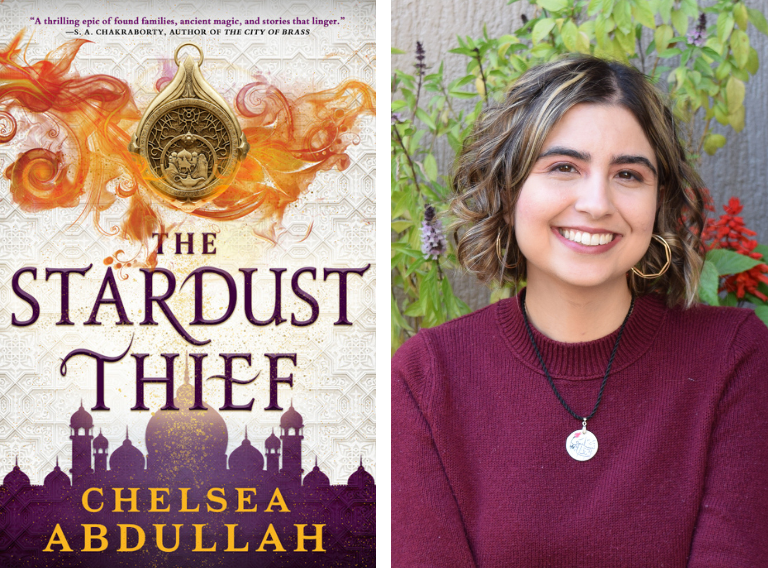
Chelsea Abdullah
(Hachette Book Group/Orbit)
Inspired by stories from One Thousand and One Nights, this book weaves together the gripping tale of a legendary smuggler, a cowardly prince, and a dangerous quest across the desert to find a legendary, magical lamp.
Neither here nor there, but long ago . . .
Loulie al-Nazari is the Midnight Merchant: a criminal who, with the help of her jinn bodyguard, hunts and sells illegal magic. When she saves the life of a cowardly prince, she draws the attention of his powerful father, the sultan, who blackmails her into finding an ancient lamp that has the power to revive the barren land—at the cost of sacrificing all jinn.
With no choice but to obey or be executed, Loulie journeys with the sultan's oldest son to find the artifact. Aided by her bodyguard, who has secrets of his own, they must survive ghoul attacks, outwit a vengeful jinn queen, and confront a malicious killer from Loulie's past. And, in a world where story is reality and illusion is truth, Loulie will discover that everything—her enemy, her magic, even her own past—is not what it seems, and she must decide who she will become in this new reality.
Chelsea Abdullah is an American-Kuwaiti writer born and raised in Kuwait, where she grew up listening to stories about mysterious desert creatures and wily (only sometimes likable) heroes. Consumed by wanderlust, she has put down roots in various states. After earning her MA in English at Duquesne University, she moved to New York, where she currently lives. When not immersed in her own fictional worlds, she spends her free time playing video games, doodling characters, and hoarding books she doesn’t have the shelf space for.
Fiction Award
If an Egyptian Cannot Speak English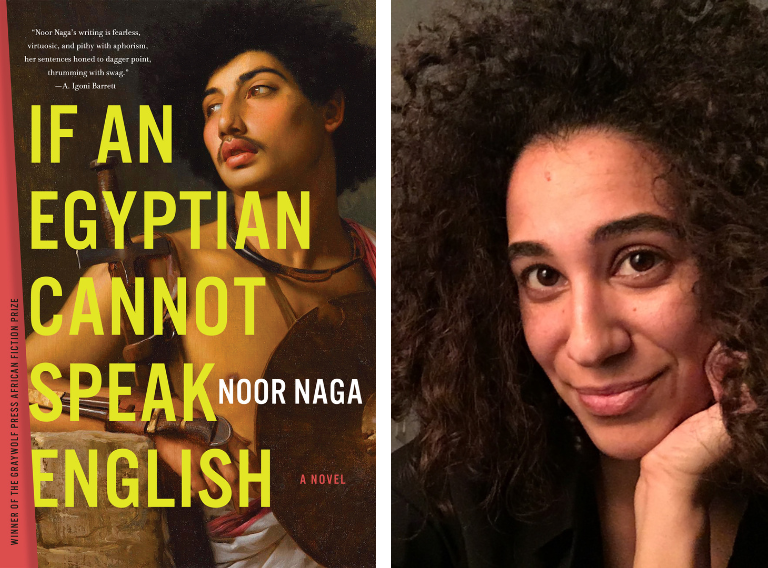
Noor Naga
(Graywolf Press)
In the aftermath of the Arab Spring, an Egyptian American woman and a man from the village of Shobrakheit meet at a café in Cairo. He was a photographer of the revolution, but now finds himself unemployed and addicted to cocaine, living in a rooftop shack. She is a nostalgic daughter of immigrants “returning” to a country she’s never been to before, teaching English and living in a light-filled flat with balconies on all sides. They fall in love and he moves in. But soon their desire—for one another, for the selves they want to become through the other—takes a violent turn that neither of them expected.
A dark romance exposing the gaps in American identity politics, especially when exported overseas, If an Egyptian Cannot Speak English is at once ravishing and wry, scathing and tender. Told in alternating perspectives, Noor Naga’s experimental debut examines the ethics of fetishizing the homeland and punishing the beloved . . . and vice versa. In our globalized twenty-first-century world, what are the new faces (and races) of empire? When the revolution fails, how long can someone survive the disappointment? Who suffers and, more crucially, who gets to tell about it?
Noor Naga is an Alexandrian writer who was born in Philadelphia, raised in Dubai, studied in Toronto, and now lives in Cairo. Apart from her debut novel If an Egyptian Cannot Speak English, she is also the author of the verse-novel Washes, Prays. Noor teaches at the American University in Cairo.
The Evelyn Shakir Non-Fiction Award
Muslims of the Heartland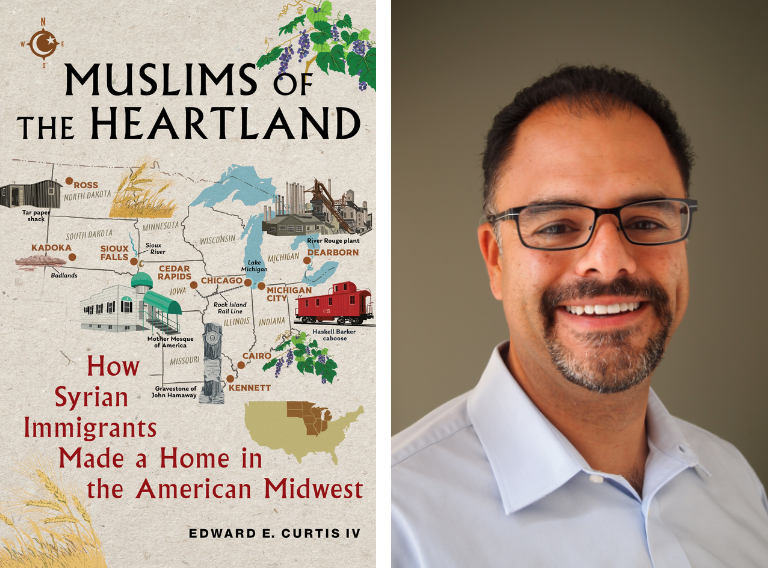
Edward E. Curtis IV
(NYU Press)
The American Midwest is often thought of as uniformly white, and shaped exclusively by Christian values. However, this view of the region as an unvarying landscape fails to consider a significant community at its very heart. Muslims of the Heartland uncovers the long history of Muslims in a part of the country where many readers would not expect to find them.
Edward E. Curtis IV, a descendant of Syrian Midwesterners, vividly portrays the intrepid men and women who busted sod on the short-grass prairies of the Dakotas, peddled needles and lace on the streets of Cedar Rapids, and worked in the railroad car factories of Michigan City. This intimate portrait follows the stories of individuals such as farmer Mary Juma, pacifist Kassem Rameden, poet Aliya Hassen, and bookmaker Kamel Osman from the early 1900s through World War I, the Roaring 20s, the Great Depression, and World War II. Its story-driven approach places Syrian Americans at the center of key American institutions like the assembly line, the family farm, the dance hall, and the public school, showing how the first two generations of Midwestern Syrians created a life that was Arab, Muslim, and American, all at the same time.
Muslims of the Heartland recreates what the Syrian Muslim Midwest looked, sounded, felt, and smelled like—from the allspice-seasoned lamb and rice shared in mosque basements to the sound of the trains on the Rock Island Line rolling past the dry goods store. It recovers a multicultural history of the American Midwest that cannot be ignored.
Edward E. Curtis IV is Professor of Religious Studies, William M. and Gail M. Plater Chair of the Liberal Arts, and Adjunct Professor of American Studies and Africana Studies at Indiana University Purdue University Indianapolis. He is the author/editor of 13 books, including our Muslims of the Heartland: How Syrian Immigrants Made a Home in the American Midwest (2022) and Muslim American Politics and the Future of US Democracy (2019).
The Evelyn Shakir Non-Fiction Award
Hadha Baladuna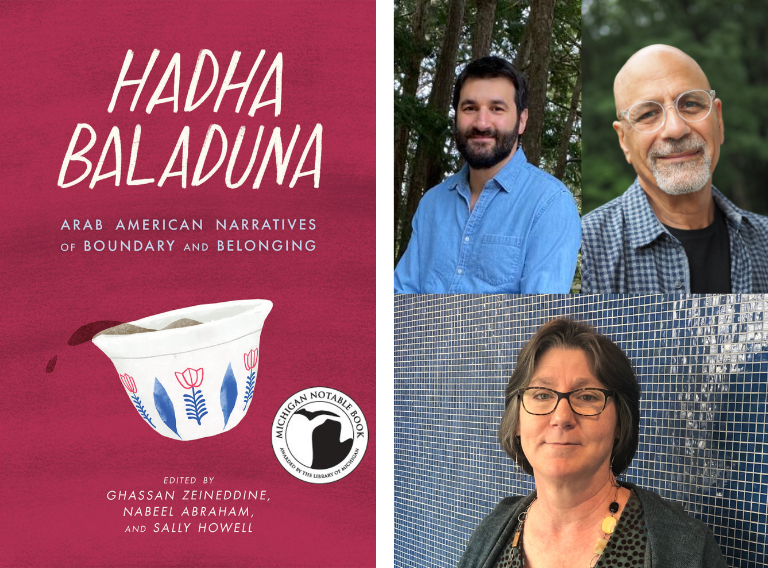
Edited by Ghassan Zeineddine, Nabeel Abraham, and Sally Howell
(Wayne State University Press)
Hadha Baladuna ("this is our country") is the first work of creative nonfiction in the field of Arab American literature that focuses entirely on the Arab diaspora in Metro Detroit, an area with the highest concentration of Arab Americans in the US. Narratives move from a young Lebanese man in the early 1920s peddling his wares along country roads to an aspiring Iraqi-Lebanese poet who turns to the music of Tupac Shakur for inspiration. The anthology then pivots to experiences growing up Arab American in Detroit and Dearborn, capturing the cultural vibrancy of urban neighborhoods and dramatizing the complexity of what it means to be Arab, particularly from the vantage point of biracial writers. Included in these works is a fearless account of domestic and sexual abuse and a story of a woman who comes to terms with her queer identity in a community that is not entirely accepting. The anthology concludes with explorations of political activism dating back to the 1960s and Dearborn’s shifting demographic landscape.
Hadha Baladuna: Arab American Narratives of Boundary and Belonging contains stories of immigration and exile by following newcomers’ attempts to assimilate into American society. Editors Ghassan Zeineddine, Nabeel Abraham, and Sally Howell have assembled a cast of emerging and established writers from a wide array of communities, including cultural heritages originating from Lebanon, Palestine, Iraq, and Yemen. The strong pattern in Arab Detroit today is to oppose marginalization through avid participation in almost every form of American identity-making. This engaged stance is not a byproduct of culture, but a new way of thinking about the US in relation to one’s homeland.
Ghassan Zeineddine is an assistant professor of creative writing at Oberlin College.
Nabeel Abraham taught anthropology for nearly three decades at Henry Ford College in Dearborn, Michigan, where he also directed the honors program. He retired in 2013. Sally Howell is associate professor of history at the University of Michigan-Dearborn and director of the Center for Arab American Studies.
The George Ellenbogen Poetry Award
O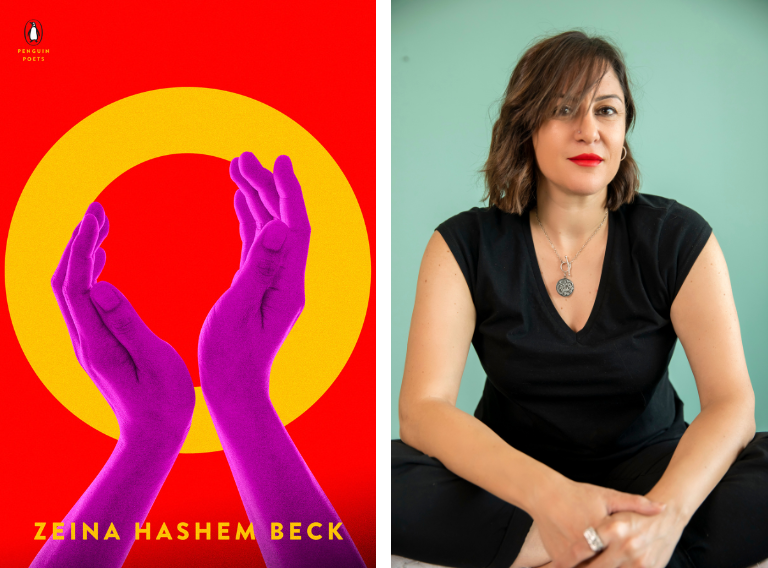
Zeina Hashem Beck
(Penguin Random House/Penguin Books)
Zeina Hashem Beck writes at the intersection of the divine and the profane, where she crafts elegant, candid poems that simultaneously exude a boundless curiosity and a deep knowingness. Formally electrifying—from lyrics and triptychs to ghazals and Zeina’s own duets, in which English and Arabic echo and contradict each other—O explores the limits of language, notions of home and exile, and stirring visions of motherhood, memory, and faith.
Zeina Hashem Beck is a Lebanese poet and the author of two previous full-length collections of poetry: Louder than Hearts (Bauhan Publishing, 2017) and To Live in Autumn (The Backwaters Press, 2014), as well as two chapbooks: 3arabi Song (Rattle, 2016) and There Was and How Much There Was (smith|doorstop, 2016). Educated in Arabic, English, and French, Zeina has a BA and an MA in English Literature from the American University of Beirut. Her poem “Maqam” won Poetry’s 2017 Frederick Bock Prize, and her work appeared in The New York Times, Ploughshares, Poetry, and elsewhere. Zeina is the co-creator and co-host, with poet Farah Chamma, of Maqsouda, a podcast about Arabic poetry produced by Sowt. She recently moved to California with her husband and two daughters.
Young Adult Award
Ida in the Middle 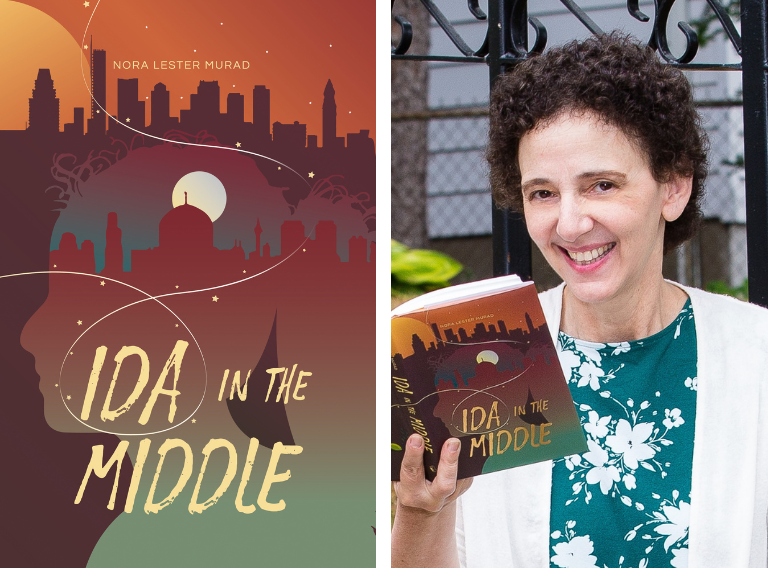
Nora Lester Murad
(Crocodile Books)
Ida, a Palestinian-American girl, eats a magic olive that takes her to the life she might have had in her parents’ village near Jerusalem. An important coming of age story that explores identity, place, voice, and belonging.
Every time violence erupts in the Middle East, Ida knows what’s coming next. Some of her classmates treat her like it’s all her fault—just for being Palestinian! In eighth grade, Ida is forced to move to a different school. But people still treat her like she’ll never fit in. Ida wishes she could disappear.
One day, dreading a final class project, Ida hunts for food. She discovers a jar of olives that came from a beloved aunt in her family’s village near Jerusalem. Ida eats one and finds herself there—as if her parents had never left Palestine! Things are different in this other reality—harder in many ways, but also strangely familiar and comforting. Now she has to make some tough choices. Which Ida would she rather be? How can she find her place?
Ida’s dilemma becomes more frightening as the day approaches when Israeli bulldozers are coming to demolish another home in her family’s village…
Nora Lester Murad, PhD, is a writer and co-author of Rest in My Shade: A Poem about Roots (Interlink Books, 2018). She raised her three daughters in Palestine. She co-founded Dalia Association, Palestine’s community foundation, and founded Aid Watch Palestine, a community-driven aid accountability initiative. She now lives in Boston.
Young Adult Award
Arab, Arab All Year Long! 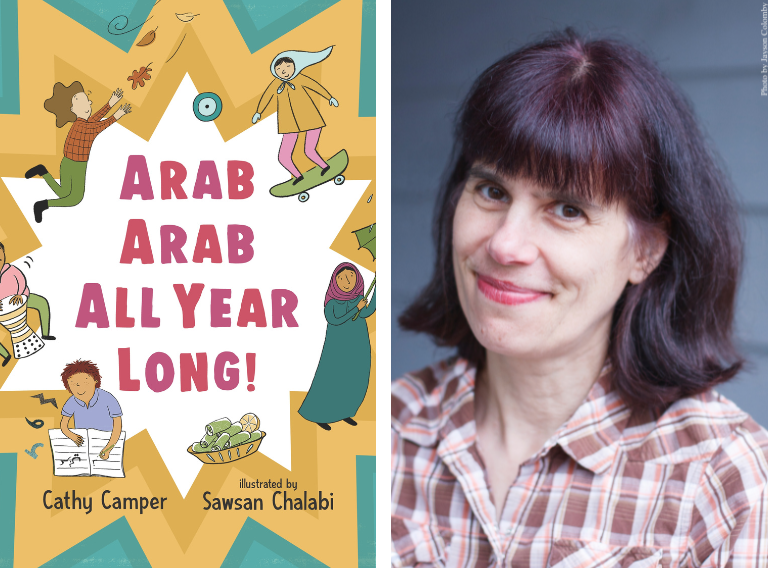
Cathy Camper
(Candlewick Press)
Yallah! From January to December, join some busy kids as they partake in traditions old and new. There’s so much to do, whether it’s learning to write Arabic or looking at hijab fashion sites while planning costumes for a local comic convention. With details as vivid as the scent of jasmine and honeysuckle perfume (made to remind Mom of Morocco), children bond with friends, honor tradition, and spend loving time with family. Accompanied by buoyant and charming illustrations, this portrait of Arab life and childhood zeal is sure to bring joy all year round. Back matter includes an extensive glossary and notes to enrich the experience for readers of any culture.
Cathy Camper is the author of Lowriders in Space, Lowriders to the Center of the Earth, Lowriders Blast from the Past, and Lowriders to the Rescue, (May 2022) all from Chronicle Books. She won the 2022 CSD Lampman Award, for her significant contribution to the children of Oregon as both a librarian and an author. Her picture book Ten Ways to Hear Snow (Dial/Penguin/Kokila) is the winner of the 2021 Burr/Worzalla Award, for Wisconsin Children’s books, and was selected to be included in Dolly Parton’s Imagination Library. Kokila will issue a Spanish edition of the book in November 2022. She has a new picture book Arab Arab All Year Long (Candlewick), June 2022, and she also wrote Bugs Before Time: Prehistoric Insects and Their Relatives (Simon & Schuster). Her zines include Sugar Needle and The Lou Reeder, and she’s a founding member of the Portland Women of Color zine collective. An Arab American, Cathy is a former board member of the Arab literary journal Mizna. Cathy is a librarian and lives in Portland, Oregon. Cathy is represented by Jennifer Laughran of Andrea Brown Literary Agency.
HONORABLE MENTIONS
Non-Fiction
Broken: The Failed Promise of Muslim Inclusion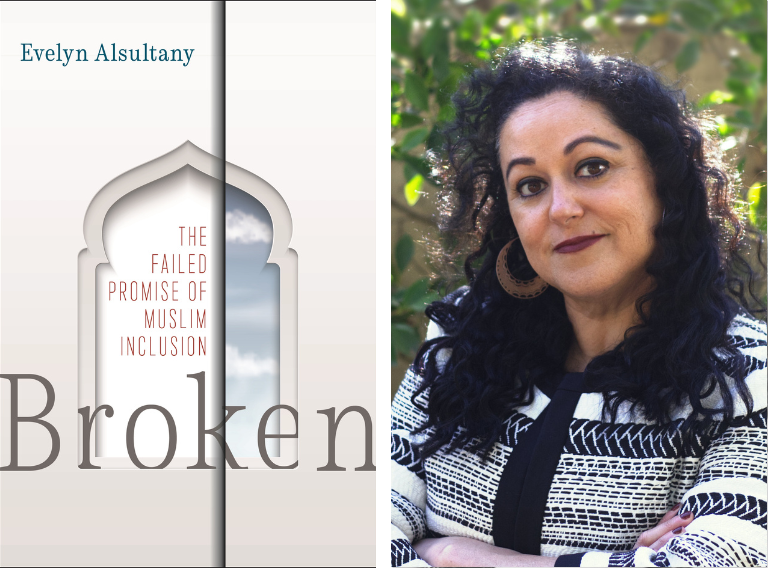
Evelyn Alsultany
(NYU Press)
One of Donald Trump’s first actions as President was to sign an executive order to limit Muslim immigration to the United States, a step toward the “complete shutdown of Muslims entering the United States” he had campaigned on. This extraordinary act of Islamophobia provoked unprecedented opposition: Hollywood movies and mainstream television shows began to feature more Muslim characters in contexts other than terrorism; universities and private businesses included Muslims in their diversity initiatives; and the criminal justice system took hate crimes against Muslims more seriously. Yet Broken argues that, even amid this challenge to institutionalized Islamophobia, diversity initiatives fail on their promise by only focusing on crisis moments.
Evelyn Alsultany argues that Muslims get included through “crisis diversity,” where high-profile Islamophobic incidents are urgently responded to and then ignored until the next crisis. In the popular cultural arena of television, this means interrogating even those representations of Muslims that others have celebrated as refreshingly positive. What kind of message does it send, for example, when a growing number of “good Muslims” on TV seem to have arrived there, ironically, only after leaving the faith? In the realm of corporations, she critically examines the firing of high-profile individuals for anti-Muslim speech—a remedy that rebrands corporations as anti-racist while institutional racism remains intact. At universities, Muslim students get included in diversity, equity, and inclusion plans but that gets disrupted if they are involved in Palestinian rights activism. Finally, she turns to hate crime laws revealing how they fail to address root causes.
In each of these arenas, Alsultany finds an institutional pattern that defangs the promise of Muslim inclusion, deferring systemic change until and through the next “crisis.”
Evelyn Alsultany is Professor in the Department of American Studies and Ethnicity at the University of Southern California’s Dornsife College and author of Arabs and Muslims in the Media: Race and Representation after 9/11. She is the co-editor of Arab and Arab American Feminisms: Gender, Violence, and Belonging and Between the Middle East and the Americas: The Cultural Politics of Diaspora. As a leading expert on the history of representations of Arabs and Muslims in the US media, she co-authored the Obeidi-Alsultany Test to help Hollywood improve representations of Muslims and serves as a consultant for Hollywood studios.
Non-Fiction
Sajjilu: A Reader in SWANA Studies 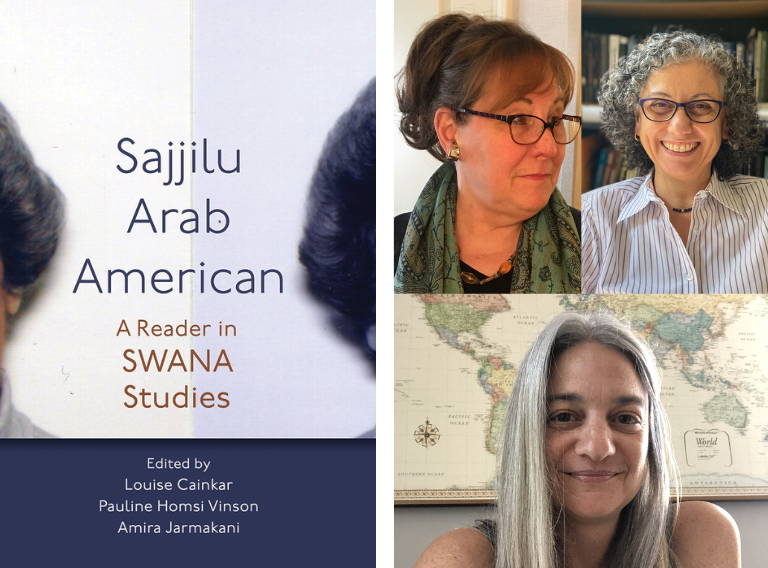
Edited by Louise Cainkar, Pauline Homsi Vinson, Amira Jarmakani
(Syracuse University Press)
The first comprehensive and multidisciplinary reader in Arab American studies, this collection includes some of the most foundational scholarship for the growing fields of Critical Muslim Studies and Critical SWANA Studies in the Americas.
Both a summative description of the field and an exploration of new directions, this multidisciplinary reader addresses issues central to the fields of Arab American, US Muslim, and Southwest Asian and North African (SWANA) American studies. Taking a broad conception of the Americas, this collection simultaneously registers and critically reflects upon major themes in the field, including diaspora, migration, empire, race and racialization, securitization, and global South solidarity. The collection will be essential reading for scholars in Arab/SWANA American studies, Asian American studies, and race, ethnicity, and Indigenous studies, now and well into the future.
Louise Cainkar is professor of sociology and social welfare and justice at Marquette University. She is the author of Homeland Insecurity: The Arab American and Muslim American Experience after 9/11 and co-editor of Arab American Women: Representation and Refusal.
Pauline Homsi Vinson is adjunct professor in English at Diablo Valley College and cofounder of the Arab American Studies Association.
Amira Jarmakani is professor of women’s, gender, and sexuality studies at San Diego State University and author of both An Imperialist Love Story: Desert Romances and the War on Terror and Imagining Arab Womanhood: The Cultural Mythology of Veils, Harems, and Belly Dancers in the U.S.
Non-Fiction
Learning America: One Woman’s Fight for Educational Justice for Refugee Children 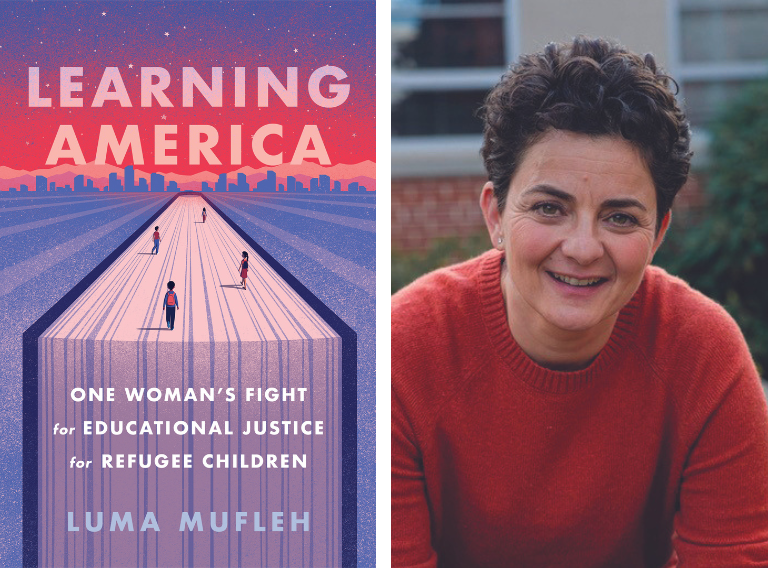
Luma Mufleh
(HarperCollins/Mariner Books)
It was a wrong turn that changed everything. When Luma Mufleh—a Muslim, gay, refugee woman from hyper-conservative Jordan—stumbled upon a pick-up game of soccer in Clarkston, Georgia, something compelled her to join. The players, 11- and 12-year-olds from Liberia, Afghanistan, and Sudan, soon welcomed her as coach of their ragtag but fiercely competitive group. Drawn into their lives, Mufleh learned that few of her players, all local public school students, could read a single word. She asks, “Where was the America that took me in? That protected me? How can I get these kids to that America?”
Learning America traces the story of how Mufleh grew a group of kids into a soccer team and then into a nationally acclaimed network of schools for refugee children. The journey is inspiring and hard-won: Fugees schools accept only those most in need; no student passes a grade without earning it; the failure of any student is the responsibility of all. Soccer as a part of every school day is a powerful catalyst to heal trauma, create belonging, and accelerate learning. Finally, this gifted storyteller delivers provocative, indelible portraits of student after student making leaps in learning that aren’t supposed to be possible for children born into trauma--stories that shine powerful light on the path to educational justice for all of America’s most left-behind.
Luma Mufleh is the founder of Fugees Family, with schools now in Georgia and Ohio and an expanding footprint bringing educational equity to refugee resettlement communities across America. Her TED Talk on educational justice for refugee families was viewed more than 1.7 million times.
Poetry
DEAR GOD. DEAR BONES. DEAR YELLOW.
Noor Hindi
(Haymarket Books)
Dear God. Dear Bones. Dear Yellow. interrogates, subverts, and expands these questions through poems that are formally and lyrically complex, dynamic, and innovative. With rich intertextuality and an unwavering eye, Noor Hindi explores and interrogates colonialism, religion, patriarchy, and the complex intersections of her identity.
Featuring her widely circulated poem, “Fuck Your Lecture on Craft, My People Are Dying,” this book is an incomparable force of fury and precision from a powerful and unstoppable poet. Noor Hindi’s collection is ultimately a provocation: on trauma, on art, and on what it takes to truly see the world for what it is/isn’t and change it for the better.
Noor Hindi (she/her/hers) is a Palestinian-American poet and reporter. She is a 2021 Ruth Lilly and Dorothy Sargent Rosenberg Poetry Fellow. Dear God. Dear Bones. Dear Yellow is her debut collection of poems. She lives in Dearborn.
Poetry
Your Blue and the Quiet Lament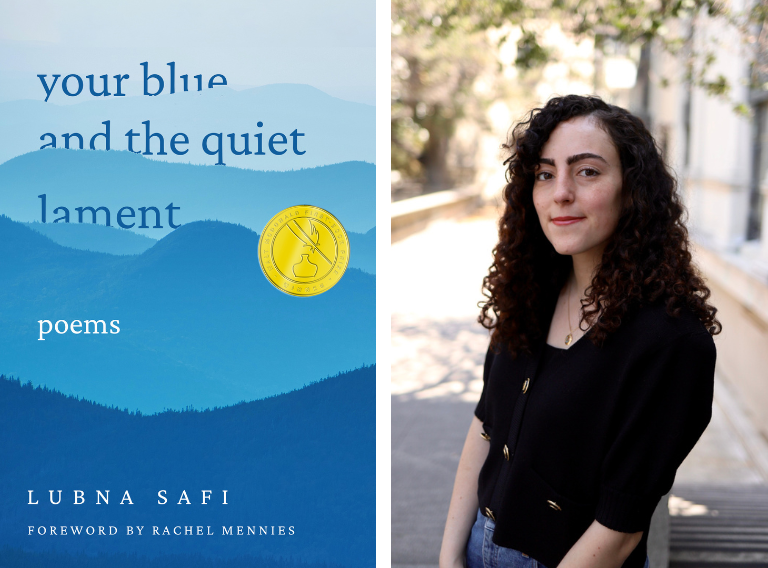
Lubna Safi
(Texas Tech University Press)
Your Blue and the Quiet Lament records the textures of grief after a cousin’s murder at the hands of the Syrian state reaches the poet through a long-distance phone call. The poems trace a narrative of arrest, imprisonment, and torture in Syria and interweave the difficulties a family experiences in the diaspora.
Shifting between the death of poet Federico García Lorca and that of her cousin, Lubna’s poetry contends with personal loss by distancing the meaning of one death through the intermediary of another. Yet the distortion of distance is already there—in the language, in the geographic space, in time, in the grief itself—tinged with blue.
As she recalls childhood memories and imagines conversations with her dead cousin, Lubna’s poetry whispers, calls out, sings, laments, pens letters, photographs, sketches, paints, and prays in an attempt to exhaust grief.
Lubna Safi was born in Detroit and grew up in the Midwest. She is currently completing a PhD at the University of California, Berkeley. Along with poetry, Lubna also writes fiction, literary criticism, and lyric essays. Your Blue and the Quiet Lament is her debut poetry collection.
Young Adult
The Turtle of Michigan
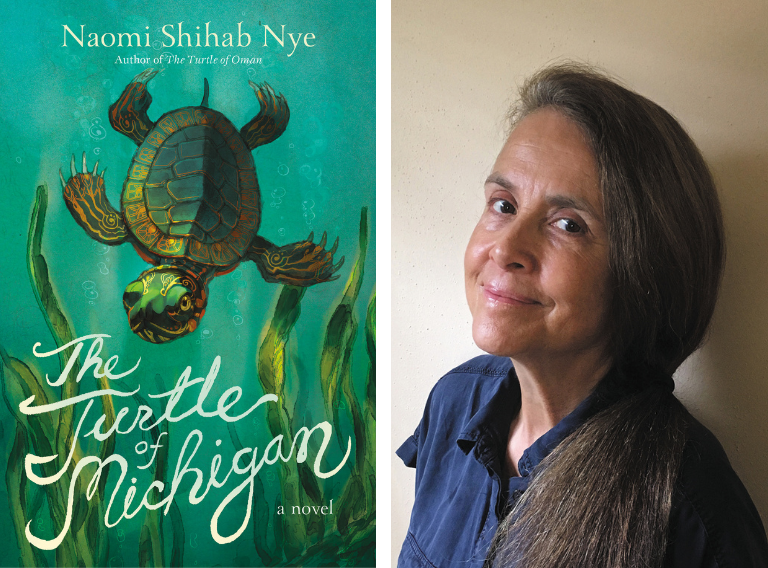 Naomi Shihab Nye
Naomi Shihab Nye
(HarperCollins Children’s Books/Greenwillow Books))
The stand-alone companion to National Book Award Finalist and beloved poet Naomi Shihab Nye’s The Turtle of Oman. The Turtle of Michigan is a deft and accessible novel that follows a young boy named Aref as he travels from Muscat, Oman, to Ann Arbor, Michigan, and adjusts to a new life and a new school in the United States. A wonderful pick for young middle grade readers and fans of Kevin Henkes, Erin Entrada Kelly, and Meg Medina.
Aref is excited for his journey from Oman to the United States, where he will reunite with his father in Ann Arbor, Michigan. Aref makes a friend on an airplane, wonders what Michigan will be like, and starts school in the United States. While he does miss his grandfather, his Sidi, Aref knows that his home in Oman will always be waiting for him.
Award-winning author Naomi Shihab Nye’s highly anticipated sequel to The Turtle of Oman explores immigration, family, and what it means to feel at home. Carrying a suitcase and memories of Oman, Aref experiences the excitement and nervousness that accompany moving to a new home and new school. The Turtle of Michigan is a great choice for reading aloud as well as a perfect read-alone for younger middle grade readers.
Naomi Shihab Nye is a poet and anthologist and the acclaimed author of Habibi: A Novel and Sitti's Secrets, a picture book, which was based on her own experiences visiting her beloved Sitti in Palestine. Her book 19 Varieties of Gazelle: Poems of the Middle East was a finalist for the National Book Award. She has taught writing and worked in schools all over the world, including in Muscat, Oman. She lives in San Antonio, Texas.
Children's Literature
Mama in Congress: Rashida Tlaib’s Journey to Washington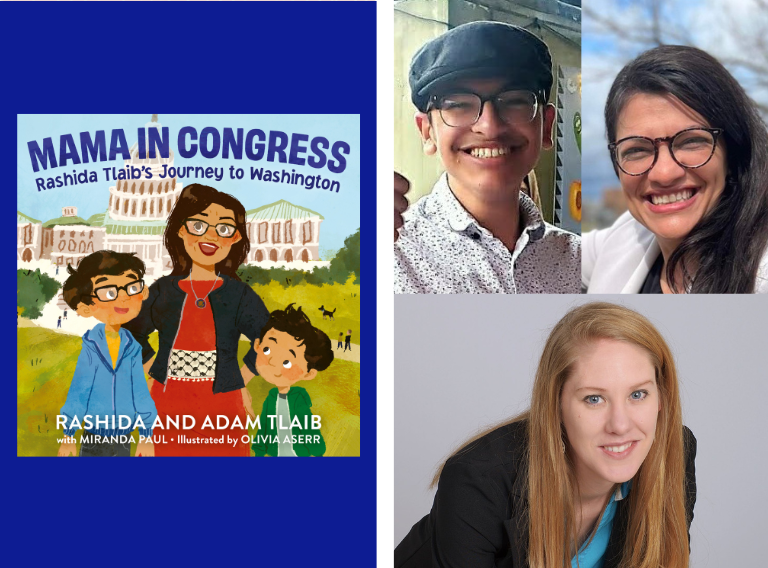
Rashida Tlaib, Adam Tlaib, Miranda Paul
(HarperCollins Children’s Books/Clarion Books)
An inspiring picture book that tells the story of Rashida Tlaib, one of the first Muslim women elected to Congress, and her family. Perfect for readers of books that celebrate trailblazing women and social activists as well as those looking for an introduction to civic engagement and how government works.
When Yousif Tlaib asks about his mom's new job in Congress, his older brother, Adam, fills him in—with some help from Rashida Tlaib herself. As he tells his mom’s story, Adam reveals information about how elections and our government work, what it means to break barriers, what motivates their mama to work for justice for all, and how love and family have guided them through this historic time in our country.
From growing up in Detroit—the eldest of fourteen siblings and the first in her immigrant family to graduate from high school—through her journey into community activism and then local politics, to eventually becoming one of the first Muslim Congresswomen and an influential national figure, Rashida Tlaib's inspiring story shows kids that they, too, can do great things and make a difference.
Rashida Tlaib is an American politician and lawyer, a well-known progressive and member of “the Squad,” and, in her own words, “a mother working for justice for all.” Her two young sons are at the root of her unwavering passion to help change lives for the better. She is the oldest of 14 children, born and raised in Detroit, the proud daughter of Palestinian immigrant parents. Rashida made history in 2008 by becoming the first Muslim woman to ever serve in the Michigan Legislature and is currently the U.S. Representative for Michigan's 13th congressional district.
Adam Tlaib is a teenager best known for his viral moment when he and his younger brother, Yousif, dabbed on the House floor.
Miranda Paul is the award-winning author of more than a dozen books for children, including Right Now!, illustrated by Bea Jackson, Speak Up, illustrated by Ebony Glenn, and Little Libraries, Big Heroes, illustrated by John Parra. She is a founding member of the organization We Need Diverse Books, and lives with her family in Green Bay, Wisconsin.
